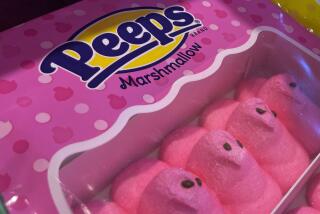State Issues Exemptions to Proposition 65
- Share via
SACRAMENTO — The Deukmejian Administration today issued Proposition 65 regulations that temporarily exempt most foods, drugs and cosmetics from the initiative’s warning requirements that begin Feb. 27.
The regulations, released by the Health and Welfare Agency, also allow businesses to warn people about toxic chemicals through labels, signs--and a controversial telephone “800” number planned by the grocery industry.
Thomas Warriner, the agency undersecretary who wrote the regulations, said they were devised after a year of discussions with industry, agricultural and environmentalist groups concerned about Proposition 65.
“I don’t think we ever gave everybody what they truly wanted. We tried to give them what we thought they needed” to follow the initiative’s warning requirements, Warriner told reporters.
Exemption of Toxics
In one of the most controversial regulations, the agency said that food, drugs, cosmetics and medical devices manufactured under existing federal or state standards do not have to be labeled even though they contain chemicals on the state’s list of those that cause cancer or birth defects.
That exemption will be a temporary one, until the state studies the individual chemicals that occur in food or drugs and determines whether there should be a stricter standard.
The regulations are sure to prompt lawsuits by both sides.
Environmentalist groups that backed the 1986 initiative are preparing lawsuits to challenge the regulations to be issued by the agency. They expect Gov. George Deukmejian, whom they have already sued once over implementation of Proposition 65, to issue rules they feel will weaken the initiative’s intent.
Starts on Feb. 27
On Feb. 27, Proposition 65’s first warning requirement begins. It requires any large business that exposes people to any of 29 chemicals that cause cancer or birth defects to issue a warning.
The regulations will specify the kind of warnings that are acceptable and list any exemptions. Several industries have asked that any food, cosmetics, drugs or medical devices manufactured under current federal or state regulation be exempted from the warning requirement, at least temporarily.
The Environmental Working Group, a coalition of business, industry and agricultural trade associations, says individual companies are waiting for the regulations to make final decisions about the warnings they will issue.
More to Read
Get the L.A. Times Politics newsletter
Deeply reported insights into legislation, politics and policy from Sacramento, Washington and beyond. In your inbox twice per week.
You may occasionally receive promotional content from the Los Angeles Times.









